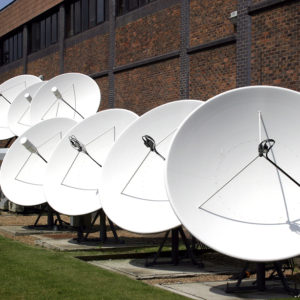As the Federal Communications Commission develops plans to take up the issue of freeing wireless spectrum to help boost the growth of 5G, diverse coalitions on both the left and right agree a public auction selling off a healthy part of mid-band spectrum is in the best interest of the country and taxpayers.
A letter to the FCC co-signed by the Competitive Carriers Association, America’s Communication Association and Charter Communications advocates a plan to free up at least 370 megahertz of spectrum in the 3.7 to 4.2 GHz (mid) band “while also concurrently making all existing users of the spectrum whole.”
That is more than the 180 MHz proposed by the C-Band Alliance, a group of satellite operators who want spectrum allocated via private sales. The CBA, made up of Eutelsat, Intelsat, SES and Telestat, has pitched a plan that would use some of the proceeds to launch satellites to replace the lost capacity from the spectrum sales.
But critics are concerned about the idea of putting strategic American taxpayer assets in the hands of overseas businesses without any assurance that taxpayers would get any compensation from the “sale.” Additionally, multiple companies have argued that the plan would lead to litigation and slow the availability of spectrum for 5G development.
Colleen King, vice president of regulatory affairs for Charter, said an auction instead of a private “sale” would allow companies to decide how much they want to pay for the spectrum using proven market mechanisms. “We don’t think that backroom deals by private companies allow that,” she said.
The coalition that Charter belongs to believes more spectrum can be “refarmed” without necessitating the launch of additional satellites proposed by CBA to make up for the spectrum given up by satellite operators. The coalition’s letter also emphasizes a plan that would develop spectrum aggregation limits and licensing rules to encourage auction participation and interoperability.
According to the text of the plan, shifting most satellite-enabled television broadband on the C-band to fiber will free up more spectrum. The coalition is calling on the FCC to pay for this estimated $6 billion to $7 billion transition with proceeds from the spectrum auction.
A second letter from a coalition that includes the Public Interest Spectrum Coalition and Dynamic Spectrum Alliance also advocates for a FCC-run auction to allocate the spectrum.
“Unlocking every megahertz of the grossly underutilized C-band will promote a more inclusive, robust and affordable 5G wireless ecosystem for all Americans,” the letter states.
This letter, co-signed by nearly two dozen organizations including Benton Foundation, Common Cause, Consumer Reports and Public Knowledge, also emphasizes that some of the proceeds should go to fixed wireless services (a technique that beams a high-speed internet signal from cell towers to reach nearby areas). This can be a more cost-effective way to provide broadband to homes and businesses in rural areas than fiber.
“A private sale of the C-Band would merely serve to enrich a handful of foreign satellite companies that have already conceded they hold spectrum far in excess of what they need to serve their customers,” said Phillip Berenbroick, senior policy counsel at Public Knowledge. “Allowing this spectrum to remain underutilized or permitting a private sale will not serve the public interest or help achieve pressing national goals, such as closing the digital divide.”
The FCC is expected to take up the issue by the end of the year as it ramps up plans to reallocate spectrum to aid the rise of 5G. The commission voted last week to establish an auction for parts of the 2.5 GHz spectrum originally allocated for educational programming that was never used.

